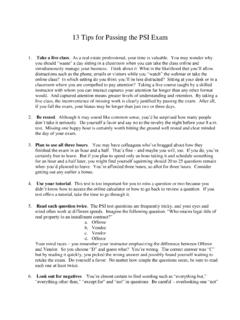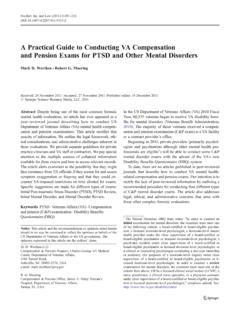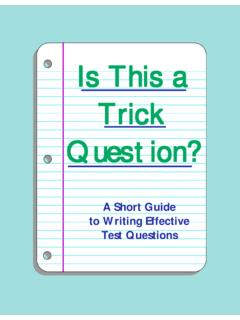Transcription of Tip Sheet on Exam Writing - Eric E. Johnson
1 Page 1 of 11 Tip Sheet on How to Write a Law School Essay Exam Professor Eric E. Johnson Dated: Fall 2017 Law School exams are Completely Different Law school exams are completely different from what you ve encountered before. Successful students coming from undergrad generally will have learned that success on an essay exam means regurgitating information, doing an information dump, as I heard one person describe it. It is crucial that you understand that this is not how law school exams work. Feeding back into a law-school exam answer all the information you ve learned by repeating that information is completely ineffective. This is especially important for first-semester 1Ls to learn. If you try to answer a law school exam in a way that worked for a subject like history, philosophy, or political science, the result will be likely be disastrous.
2 I don t mean to scare anyone. I just want to make sure to eliminate misconceptions that could come between you and the success you deserve to achieve after a semester of hard work. So, what is it you must do instead of repeating back information about the law? You must use your knowledge from the course to generate legal analysis. More specifically, you must take the law you ve learned in the course and apply it to the facts provided in the exam. Doing this demonstrates that you have mastered the material and gained corresponding analytical skills. The Golden Purple Key: Applying Law to Facts The golden key to law-school exam Writing is applying law to facts. (Or facts to law. Whichever way you want to think about it.) This is so because applying law to facts is legal analysis. And legal analysis is what you must do on the exam.
3 To create legal analysis, you necessarily must mix the law and the facts together in a way that produces some result. If law is blue and facts are red, then you want to make purple. In other words, remember that making purple is golden. So just remember to use the Golden Purple Key: red + blue = golden purple Page 2 of 11 (Yes, I m completely aware of what a mess I m making with mixed color metaphors, but I m hopeful it will help you remember the essence of good exam Writing !) Why is applying law to facts so crucial? A little reflection will show you why this must be the case. Providing the facts alone cannot indicate your mastery of the material. With an issue-spotter exam, you have the facts in front of you. Thus, I can t give you any points for repeating them back to me. Most students understand this, but I ve found that, in the pressure of the exam, some students will spend time and words just reiterating the facts.
4 Providing the law alone does not indicate your mastery of the material either. Thus, I can t give you any points for repeating back to me the law. (Note, however, that some professors do want you to repeat the law as an initial step before doing So I recommend that for classes other than mine, you inquire, in a nice way, about the professor s views on this point.) I could see some sense in awarding a point for correctly stating the rule of law if the exam were completely closed-book. But if you are taking an open-book exam, including one that is partially open-book,2 then you have the law in front of you. In such a case, correctly copying statements of legal rules, even relevant ones, into your exam response does not, as I see it, demonstrate your mastery of the material. You ve got to apply the law to the facts.
5 That is how you show that you actually understand the law. Now, the application of law to facts is more complicated than merely mixing the two. (Although mixing is a good start!) What you must do is put the relevant fact with the relevant legal doctrine and explain what comes of the combination. To accomplish this, as a mechanical matter, it is helpful to talk about the facts and the law in the same sentence and to use words such as because and therefore. These are what you might call analytical-transmission words. Using these words helps you force yourself to show the legal analysis. Sometimes since works in place of because. And sometimes so works in place of therefore. You can use your ear. But I strongly suggest that because and therefore be your go-to words, and I would recommend steering clear of fancy expressions like on account of or inasmuch as.
6 3 1 I ve asked around, and there s clearly a split among law professors in this regard. Some professors award points for correctly stating a rule of law in an answer, and some don t. I don t know which view predominates, but both views are common. At any rate, even among law professors who give points for stating the rule, what those law professors prize above all is the analysis. On that, everyone I ve ever talked to is in agreement. 2 By a partial open-book basis, I mean that outside references are allowed, but with limitations. My essay exams have generally been given on a full or partial open-book basis. Check your syllabus to find the rules for your particular course. 3 There s no point in trying to use alternative, fancy expressions for because and therefore.
7 Good lawyers value simple, straightforward language. I just opened up copies of a number of amicus briefs written by other law professors and did a word search. They are brimming with instances of because. There are also many instances of therefore, but because outnumbers therefore about 4-to-1. Occurrences of since were more rare. I found zero instances of on account of or inasmuch as. As pop singer P!nk put it, Don t get fancy, just get dancy. Page 3 of 11 Here are some examples of mixing law and facts together, providing a conclusion, and using because or therefore as a connector all in the same sentence:4 (Ex. 1) Abby has a good claim for assault against Danny because, by shouting That saw blade is going to hit you! while triggering the loud saw noise, Danny created an immediate apprehension of a harmful touching.
8 (Ex. 2) The plaintiff in this case cannot prove actual causation under the but- for test because the damage to the gymnasium would have happened anyway, even if the defendant had not been intoxicated. (Ex. 3) The UCC s statute of frauds requires a Writing evidencing a sale- of- goods contract for $500 or more; therefore, the oral contract to sell the painting for $11,000 is not enforceable. Don t those passages sound good? Doesn t that sound like a lawyer or a judge talking? That s what professors want you to sound like, too. To help you see how to discuss both the law and facts together in order to create legal analysis, I have diagrammed the above sample sentences in color.
9 Facts are red. Law is blue. Legal conclusions are purple. An underlined analytical-transmission word ( because or therefore ) connects it all together. Example 1 follows this pattern: legal conclusion because facts + law Ex. 1(color) Abby has a good claim for assault against Danny because, by shouting That saw blade is going to hit you! while triggering the loud saw noise, Danny created an immediate apprehension of a harmful touching. Example 2 follows this pattern: legal conclusion law because facts Ex. 2(color) The plaintiff in this case cannot prove actual causation under the but- for test because the damage to the gymnasium would have happened anyway, even if the defendant had not been intoxicated.
10 Example 3 follows this pattern: law therefore facts legal conclusion Ex. 3(color) The UCC s statute of frauds requires a Writing evidencing a sale- of- goods contract for $500 or more; therefore, the oral contract to sell the painting for $11,000 is not enforceable. You can see that these examples present different ways of mixing facts and law together to create analysis. Don t make too much of these particular patterns. There s no magic in any particular way of doing it. Many, many other patterns are possible. The indispensible point is to remember the Golden Purple Key: Force the law and facts 4 Example 1 is from a practice exam called Ye Olde Sawmill, which can be found in my exam archive at Examples 2 and 3 are completely made up.









